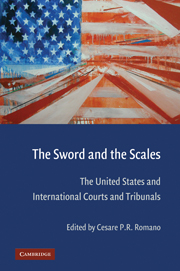Book contents
- Frontmatter
- Contents
- Preface
- Acknowledgments
- Abbreviations
- Contributors
- 1 International Courts and Tribunals and the Rule of Law
- 2 American Public Opinion on International Courts and Tribunals
- 3 Arbitration and Avoidance of War: The Nineteenth-Century American Vision
- 4 The United States and the International Court of Justice: Coping with Antinomies
- 5 The U.S. Supreme Court and the International Court of Justice: What Does “Respectful Consideration” Mean?
- 6 U.S. Attitudes toward International Criminal Courts and Tribunals
- 7 The United States and the Inter-American Court of Human Rights
- 8 From Paradox to Subsidiarity: The United States and Human Rights Treaty Bodies
- 9 The U.S. and International Claims and Compensation Bodies
- 10 Does the United States Support International Tribunals? The Case of the Multilateral Trade System
- 11 The United States and Dispute Settlement under the North American Free Trade Agreement: Ambivalence, Frustration, and Occasional Defiance
- 12 Dispute Settlement under NAFTA Chapter 11: A Response to the Critics in the United States
- 13 The United States and International Courts: Getting the Cost-Benefit Analysis Right
- Index
- References
12 - Dispute Settlement under NAFTA Chapter 11: A Response to the Critics in the United States
Published online by Cambridge University Press: 05 June 2012
- Frontmatter
- Contents
- Preface
- Acknowledgments
- Abbreviations
- Contributors
- 1 International Courts and Tribunals and the Rule of Law
- 2 American Public Opinion on International Courts and Tribunals
- 3 Arbitration and Avoidance of War: The Nineteenth-Century American Vision
- 4 The United States and the International Court of Justice: Coping with Antinomies
- 5 The U.S. Supreme Court and the International Court of Justice: What Does “Respectful Consideration” Mean?
- 6 U.S. Attitudes toward International Criminal Courts and Tribunals
- 7 The United States and the Inter-American Court of Human Rights
- 8 From Paradox to Subsidiarity: The United States and Human Rights Treaty Bodies
- 9 The U.S. and International Claims and Compensation Bodies
- 10 Does the United States Support International Tribunals? The Case of the Multilateral Trade System
- 11 The United States and Dispute Settlement under the North American Free Trade Agreement: Ambivalence, Frustration, and Occasional Defiance
- 12 Dispute Settlement under NAFTA Chapter 11: A Response to the Critics in the United States
- 13 The United States and International Courts: Getting the Cost-Benefit Analysis Right
- Index
- References
Summary
The United States has authorized certain investor-state disputes arising under the North American Free Trade Agreement (NAFTA) to be resolved through arbitration. The arbitral tribunals, which apply the NAFTA and applicable rules of international law to the disputes, have come under substantial attack. Critics charge that the tribunals act as super-appellate courts and tower over domestic courts. Others have pointed out the tribunals' alleged lack of “democratic legitimacy.” Tribunal procedures are believed to be shrouded in secrecy. The legal soundness of tribunal awards has been questioned.
These challenges should not be taken lightly. In addition to raising nagging issues that threaten dispute resolution, the assault reflects a concern from both within and outside of the United States about the loss of sovereign control over matters essential to governance. As more nations enter into bilateral investment treaties (BITs) or free trade agreements (FTAs), which may authorize arbitration of investor-state disputes, the criticism is likely to mount and come from a wider range of sources.
A measured and objective response to the criticism, which sorts the wheat from the chaff and constructively identifies areas of concern and means to address the concerns, is in order. This is the objective of this chapter. It also examines the response to the criticism to date, which has led to reforms of the arbitral process.
- Type
- Chapter
- Information
- The Sword and the ScalesThe United States and International Courts and Tribunals, pp. 395 - 418Publisher: Cambridge University PressPrint publication year: 2009
References
- 1
- Cited by



